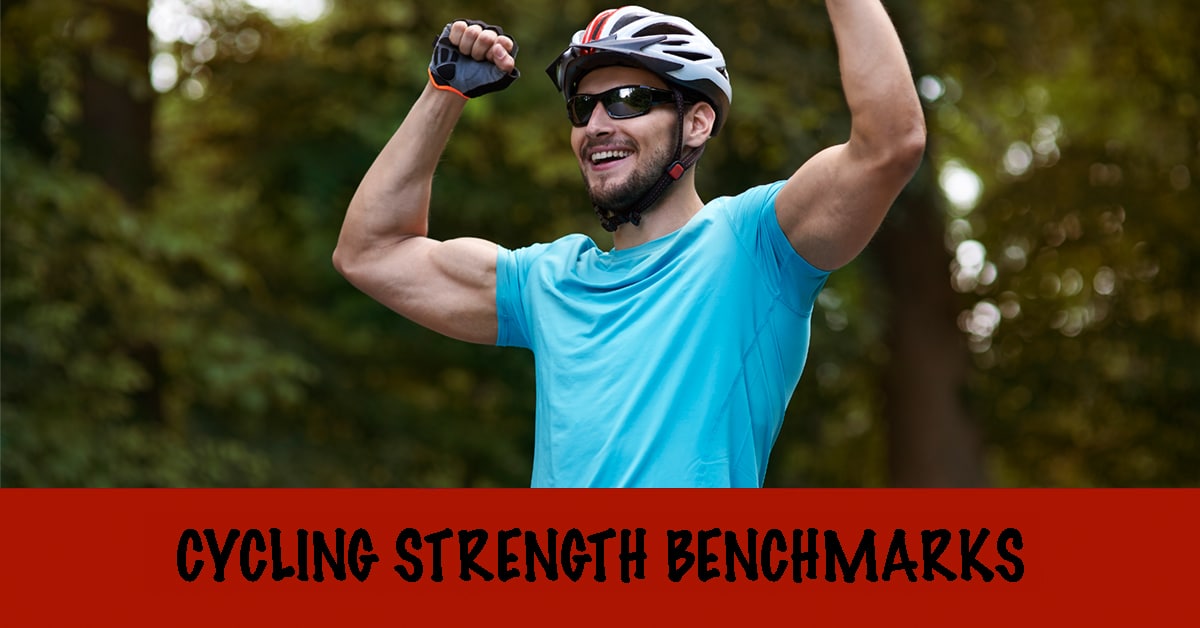Cycling Strength Benchmarks

It’s important for cyclists to have a level of functional strength, both on and off the bike. Incorporating strength work into your training will help you to become a better cyclist and help to prevent injury.
Cycling is a non-weight bearing sport, this can affect bone density. Adding some weight training to your routine will help improve bone density.
In a recent blog post on TrainerRoad, Chad Timmerman outlined some strength training benchmarks that cover a range of cycling disciplines.
Cycling Strength Benchmark Calculator
To calculate your personalised cycling strength benchmarks, enter your gender, weight and level in the calculator.
Note: Enter your weight in lbs or kgs; the output weights will use the same unit.
These benchmarks find the balance between an appropriate amount of strength for your discipline without adding extra muscle mass that you don’t need.
These guidelines aren’t meant as a training guide but a benchmark to work towards. If you’re looking for a simple strength training routine, check out our article on the 5×5 Weight Training Method.
Level Three (Sprinter)
Criterium Racers, Short Track Cross-Country Mountain Bikers, Gravity-Oriented Mountain Bikers, Enduro Racers, Cyclocross Racers, Track Sprinters
Level Three – Men
| Exercise | Prescription | Example Prescription (175lb/80kg) |
| Deadlift | 5 Reps 150% BW | 260 lbs / 120 kg |
| Back Squat | 5 Reps 125% BW | 220 lbs / 100 kg |
| Bench Press | 5 Reps 90% BW | 165 lbs / 75 kg |
| Barbell Row | 5 Reps 90% BW | 165 lbs / 75 kg |
| Pull/Chin-Ups | Number of Reps | 15 Reps |
| Military Press | 5 Reps 55% BW | 100 lbs / 45 kg |
Level Three – Women
| Exercise | Prescription | Example Prescription (135lb/60kg) |
| Deadlift | 5 Reps 105% BW | 140 lbs / 65 kg |
| Back Squat | 5 Reps 87% BW | 120 lbs / 55 kg |
| Bench Press | 5 Reps 65% BW | 90 lbs / 40 kg |
| Barbell Row | 5 Reps 65% BW | 90 lbs / 40 kg |
| Pull/Chin-Ups | Number of Reps | 5 Reps |
| Military Press | 5 Reps 40% BW | 55 lbs / 25 kg |
Level Two (All-Rounder)
Cross-Country Mountain Bikers, Time Trialists, Rolling Road Racers, Cross-Country Marathon Mountain Bikers, Full-Distance Triathletes, Endurance Track Cyclists
Level Two – Men
| Exercise | Prescription | Example Prescription (175lb/80kg) |
| Deadlift | 5 Reps 100% BW | 175 lbs / 80 kg |
| Back Squat | 5 Reps 75% BW | 130 lbs / 60 kg |
| Bench Press | 5 Reps 55% BW | 100 lbs / 45 kg |
| Barbell Row | 5 Reps 55% BW | 100 lbs / 45 kg |
| Pull/Chin-Ups | Number of Reps | 10 Reps |
| Military Press | 5 Reps 35% BW | 60 lbs / 30 kg |
Level Two – Women
| Exercise | Prescription | Example Prescription (135lb/60kg) |
| Deadlift | 5 Reps 70% BW | 95 lbs / 45 kg |
| Back Squat | 5 Reps 50% BW | 70 lbs / 30 kg |
| Bench Press | 5 Reps 40% BW | 55 lbs / 25 kg |
| Barbell Row | 5 Reps 40% BW | 55 lbs / 25 kg |
| Pull/Chin-Ups | Number of Reps | 3 Reps |
| Military Press | 5 Reps 20% BW | 30 lbs / 15 kg |
Level One (Climber)
Climbing Road Racers, Sprint Triathletes, Olympic Distance Triathletes, Half-Distance Triathletes, Gravel Racers, Gran Fondo Riders
Level One – Men
| Exercise | Prescription | Example Prescription (175lb/80kg) |
| Deadlift | 5 Reps 75% BW | 130 lbs / 60 kg |
| Back Squat | 5 Reps 50% BW | 90 lbs / 40 kg |
| Bench Press | 5 Reps 40% BW | 70 lbs / 30 kg |
| Barbell Row | 5 Reps 40% BW | 70 lbs / 30 kg |
| Pull/Chin-Ups | Number of Reps | 5 Reps |
| Military Press | 5 Reps 20% BW | 40 lbs / 20 kg |
Level One – Women
| Exercise | Prescription | Example Prescription (135lb/60kg) |
| Deadlift | 5 Reps 50% BW | 70 lbs / 30 kg |
| Back Squat | 5 Reps 35% BW | 50 lbs / 20 kg |
| Bench Press | 5 Reps 25% BW | 35 lbs / 15 kg |
| Barbell Row | 5 Reps 25% BW | 35 lbs / 15 kg |
| Pull/Chin-Ups | Number of Reps | 1 Reps |
| Military Press | 5 Reps 15% BW | 20 lbs / 10 kg |
Why is Strength Training Important For Cyclists?
Most cyclists know that strength training is important, but many don’t know why. Here are four good reasons to make strength training a priority, especially if you’re looking to improve your cycling performance.
1. Stronger muscles mean more power
This one is pretty simple: the stronger your muscles are, the more power you can generate on the bike. And more power means you can ride faster.
While this is no substitute for time in the saddle, taking time to develop explosive power in muscles and general stability can have some real benefits on the road.
2. Strength training can improve your pedalling efficiency
If you want to ride faster, you not only need to be able to generate more power, you need to do so efficiently. Strength training can help with this by improving your pedalling technique and making your muscles work more efficiently.
3. Stronger muscles can help you climb hills faster
Climbing hills is one of the most difficult things to do on a bike, and it’s even harder if you’re not strong enough. Strength training can help you develop the muscles you need to power up hills with ease. However, this can be a double-edged sword, as too much muscle mass will slow you down as the non-cycling specific muscle mass affects your power-to-weight ratio.
4. Strength training can help prevent injuries
If your only sport is cycling, you can put yourself at a higher risk of injury. Weight lifting can help protect your joints and bones from the impact of cycling.
So there you have it: four good reasons to make strength training a priority if you want to improve your cycling performance.
What’s your strength training routine? Let us know in the comments below.
Mind - Most Recent
The Benefits of Reading: How to Make Time for Books in Your Busy Life
The Power of Positive Thinking
Unleash the Power of Marginal Gains: How Small Improvements Can Lead to Big Results
12 Life-Changing Books for a Year of Personal Development
9 Steps to Supercharge Your Productivity
The Ultimate Guide to Deep Work
The Seven Habits of Highly Effective People by Stephen Covey

These numbers are based on Coach Chad s experience strength training high-level cycling athletes for 7 years. While not peer-reviewed studies, they are very well-informed guidelines that can help to direct your strength training as an endurance athlete. As a sports scientist I’m very surprised at the recommendations and benchmarks especially for climbers.
What surprises you about them?